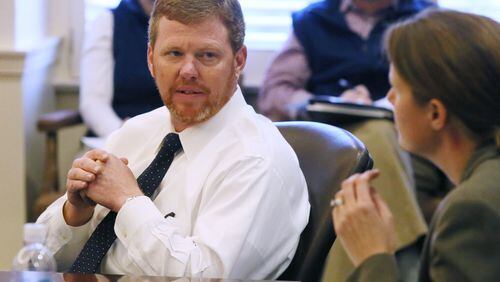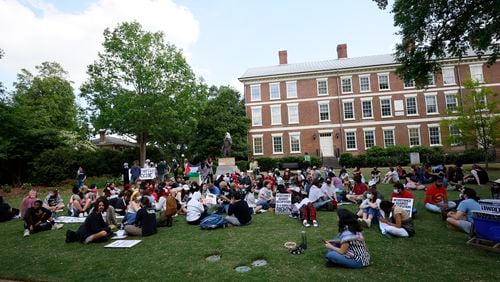After Gov. Nathan Deal signed a budget last year offering 3 percent pay raises to teachers and state employees, his team made it clear it wanted the money to go mostly to rank-and-file workers, not highly paid administrators.
That’s not exactly how it worked out in all cases, according to records obtained by The Atlanta Journal-Constitution through the state’s Open Records Act.
In the past year, the head of the Department of Transportation received a 35 percent increase, and some of his top underlings got double-digit raises. The head of the State Patrol got a 21 percent increase.
The governor's chief of staff, Chris Riley, who in June told the AJC that Deal's top staff wouldn't take raises, got an 8 percent hike, and some top aides got even bigger raises. One former gubernatorial staffer was named to a top post in the Department of Adult and Technical Education and saw his pay more than double.
Such raises rankle many rank-and-file employees who have gone without big pay increases, and teachers, some of whom the AJC reported last fall didn't get any boost in their base salaries.
"Last year Governor Deal's top staff was given huge salary increases, and again this year he has budgeted large raises for many on his staff," said John Palmer, a Cobb County educator and spokesman for the teacher group TRAGIC.
“If the state can afford to build its reserve by over $2 billion and give significant raises to the governor’s staff,” Palmer said, “certainly after nine years of stagnant wages it can afford to give teachers and other state employees significant raises.”
Deal on Wednesday called for 19 percent raises for lowly paid child welfare caseworkers, and he previously promised 20 percent more to state law enforcement officers in the upcoming year. But teachers and most state workers would get a 2 percent raise in fiscal 2018, which begins July 1.
A matter of ‘trust’
Riley said the pay raises for top staff are meant to ensure the state can retain valuable employees, some of whom could make far more money in the halls of the Capitol as lobbyists. Riley has kept most of Deal’s senior leadership team intact over the past six years.
“Many of them could make far more in the private sector,” Riley said. “It’s very important to finish the administration out strong, with people I trust to get the job done. And in the last two years of an administration, you need people around you that you trust.”
But the issue has been a sensitive one for years, particularly since the state stopped giving raises and began furloughing rank-and-file workers during the Great Recession.
Many of the state’s more than 100,000 teachers in that era wound up earning less money because they didn’t get raises and were forced to take days off without pay.
For several years, only employees working for select agencies, such as the Georgia Lottery, or in certain positions, such as University System of Georgia college presidents and Teacher Retirement System investment staff, were receiving more money.
Then teachers and state workers got some good news last year. Deal proposed and lawmakers approved 3 percent more in salary money for school systems and state agencies to dole out. Lawmakers also provided larger raises for certain jobs with high turnover rates, such as prison guards and public health nurses.
Riley sent agency heads an email in early May spelling out the importance of the raises for rank-and-file workers. He told department heads that if they thought they should get raises as well, they needed to send a request to his office or the Office of Planning and Budget director.
“As the agency head,” he wrote, “you know best where to target these state dollars.”
In October, the AJC reported that only 40 percent of school districts passed along the salary money as permanent pay raises.
As for the governor’s staff, Riley initially decided that there would be no raises for anyone earning more than $125,000. But he said Deal’s decision to rehire an attorney who previously left the office prompted him to rethink that cap. He later accepted a raise to $150,000 — and three other top staffers earning in the $130,000 range also got pay increases to $150,000.
Meanwhile, the pay for the executive counsel’s job — essentially the governor’s top lawyer — went from about $137,500 to $169,000.
A DOT windfall
The governor’s office wasn’t the only one handing out raises.
Even while state finances remained troubled coming out of the recession, the boards that run state agencies gave pay raises to their department's leadership. For instance, highly paid college presidents regularly got raises from the University System Board of Regents.
In fiscal 2016, Department of Transportation Commissioner Russell McMurry earned $185,000, according to the state’s transparency website site, Open Georgia. The DOT board voted in June to raise that to $250,000.
Jay Roberts, a former state lawmaker whom Deal appointed as DOT planning director, was paid $155,000 in fiscal 2016. His pay was raised to $186,000.
Other top transportation agency staffers also received big raises.
The DOT received a windfall — about $900 million a year in new revenue — from gas tax increases and other revenue hikes that Roberts helped get through the Legislature in 2015. But DOT officials said the agency had been working on a plan to evaluate salaries — and raise some of them — for several years.
“The department now must deliver the highest transportation investment levels ever, with the smallest staff level in our existence, some 700 less over the last 5 years,” said McMurry, who added that salaries were raised in other areas of the Transportation Department before they were increased for top staff.
“In order to recruit and retain talent — which is so important in serving the people of Georgia — an effort to right-size the agency has been underway for several years, including compensation strategies,” he said. “This effort is intended to help us with workforce recruitment and retention.”
Riley, the governor’s chief of staff, pushed for a pay raise for Georgia Public Safety Commissioner Mark McDonough, whose salary went from about $140,000 to $170,000.
Riley said McDonough’s salary had been frozen since he was appointed the head of the Department of Public Safety in 2011 — and he noted that Deal recommended 20 percent pay raises for state troopers.
“It was time to step up and pay these people in management accordingly,” Riley said.
Other Deal loyalists were also rewarded. Neil Bitting, a former Deal campaign aide who made about $60,000 in fiscal 2016, had his salary more than double to $154,500 when he became assistant commissioner of the Technical College System of Georgia.
A system spokeswoman said it was the “salary that has been previously set” for the position, which involves overseeing lobbying for the system’s 22 colleges. Riley said he deserved the salary hike. The associate and assistant vice chancellors who lobby for the University System earned $113,000 and $87,000 last year.
Even the top investment officials with the Teacher Retirement System, who earn among the highest salaries in state government, saw a boost in their pay.
Charles Cary, the chief investment officer for the TRS, had a base salary of $553,870 in fiscal 2016. This year his base salary increased to $586,000, almost a 6 percent increase. Cary also receives a six-figure incentive payout, or bonus.
State Sen. Nan Orrock, D-Atlanta, said the big raises for top earners have to be disheartening for lower-paid state employees and teachers who have gone without major increases in the past decade.
“I welcome Governor Deal’s announcement of pay increases, but when you learn of the increases going to the people with the big titles, and they are not trying to reduce income disparity, it is quite disheartening,” Orrock said. “We have some great people in our workforce performing vital functions. The right thing to do would be to address pay inequity.”
A governor pay hike?
The salary hikes in the governor’s office also raise a strange scenario, placing several of Deal’s deputies and aides in a higher pay orbit than the governor. One proposal making the rounds in the Legislature would involve a citizen’s commission to evaluate the pay and possibly recommend raises for statewide constitutional officers in 2019.
“It’s awkward. Someone up there (in the Legislature) needs to step up and take the initiative. Not for us, but for the next person. He’s underpaid for the job he has,” Riley said of Deal. “Someone needs to look at it. Yes you get free housing, yes you get transportation. But it’s a 24/7 job.”
Deal’s state salary of $139,339 is in the middle range of gubernatorial pay, according to the Council of State Governments. Salaries range from $70,000 in Maine to the $190,000 that Pennsylvania’s top executive is paid. Several governors have taken voluntary pay cuts or refused any salary at all, including Florida’s Rick Scott and Alabama’s Robert Bentley.
Lawmakers have passed state laws in the past to limit some executive pay, such as a measure capping bonuses handed out by the Georgia Lottery.
But some in Deal’s administration warned lawmakers against trying to rein in executive salary. Teresa MacCartney, the head of Deal’s budget planning office, said doing so would hobble state government.
“It’s all about recruiting the best people to run state agencies,” she said. “And if you can’t attract the top talent, you can’t find the right people to run a billion-dollar department.”
Pay increases at top level
Several top agency officials and gubernatorial staffers have gotten raises in the past year. Below are the salaries for some of those officials:
Chris Riley
Chief of staff to Gov. Nathan Deal
Fiscal 2016: $138,500
Fiscal 2017: $150,000
Russell McMurry
Commissioner, Department of Transportation
Fiscal 2016: $185,000
Fiscal 2017: $250,000
Charles Cary
Chief investment officer, Teachers Retirement System
Fiscal 2016: $553,870*
Fiscal 2017: $586,000*
Mark McDonough
Commissioner, Department of Public Safety
Fiscal 2016: $140,000
Fiscal 2017: $170,000
Source: State pay records
*Does not include bonuses









